Research Proposal: Factors Affecting Staff Attitude Towards Elderly
VerifiedAdded on 2023/06/14
|31
|6035
|99
Report
AI Summary
This research proposal aims to analyze the factors that influence nursing staff's attitudes towards elderly patients, leading to challenging behaviors. The study includes a literature review and interviews with registered nurses using open-ended questionnaires to validate the research objectives and answer key research questions. It examines the impact of various factors on nurses' attitudes, the effects on the mental and physical well-being of elderly patients, and recommends ways to improve nurses' attitudes. The proposal covers conflicts, staffing issues, training deficiencies, and the working environment, and their impacts on patient care. Data analysis involves qualitative assessment of interview responses, linking findings to the research objectives, and identifying research limitations. Desklib provides access to this and similar documents, offering valuable resources for students.
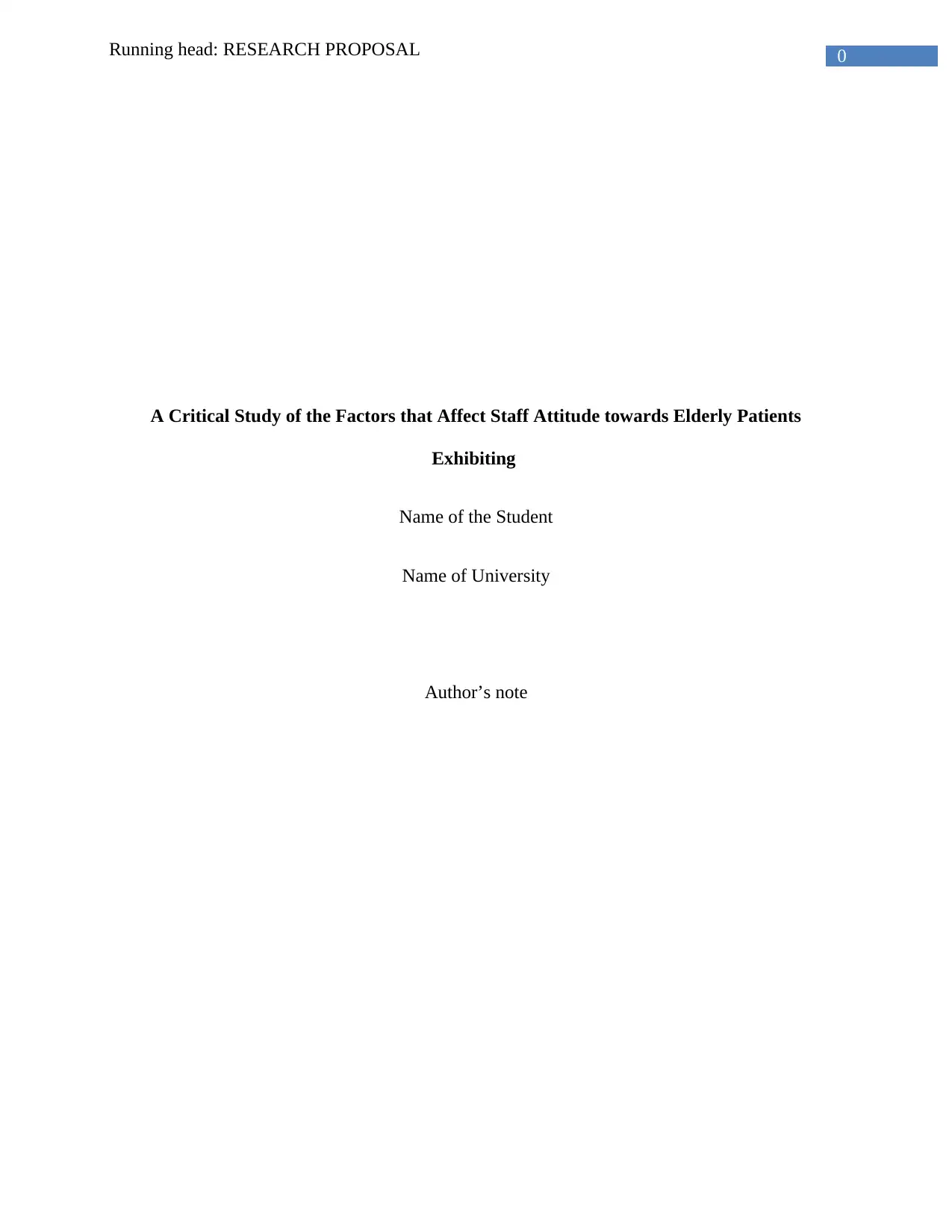
0Running head: RESEARCH PROPOSAL
A Critical Study of the Factors that Affect Staff Attitude towards Elderly Patients
Exhibiting
Name of the Student
Name of University
Author’s note
A Critical Study of the Factors that Affect Staff Attitude towards Elderly Patients
Exhibiting
Name of the Student
Name of University
Author’s note
Paraphrase This Document
Need a fresh take? Get an instant paraphrase of this document with our AI Paraphraser
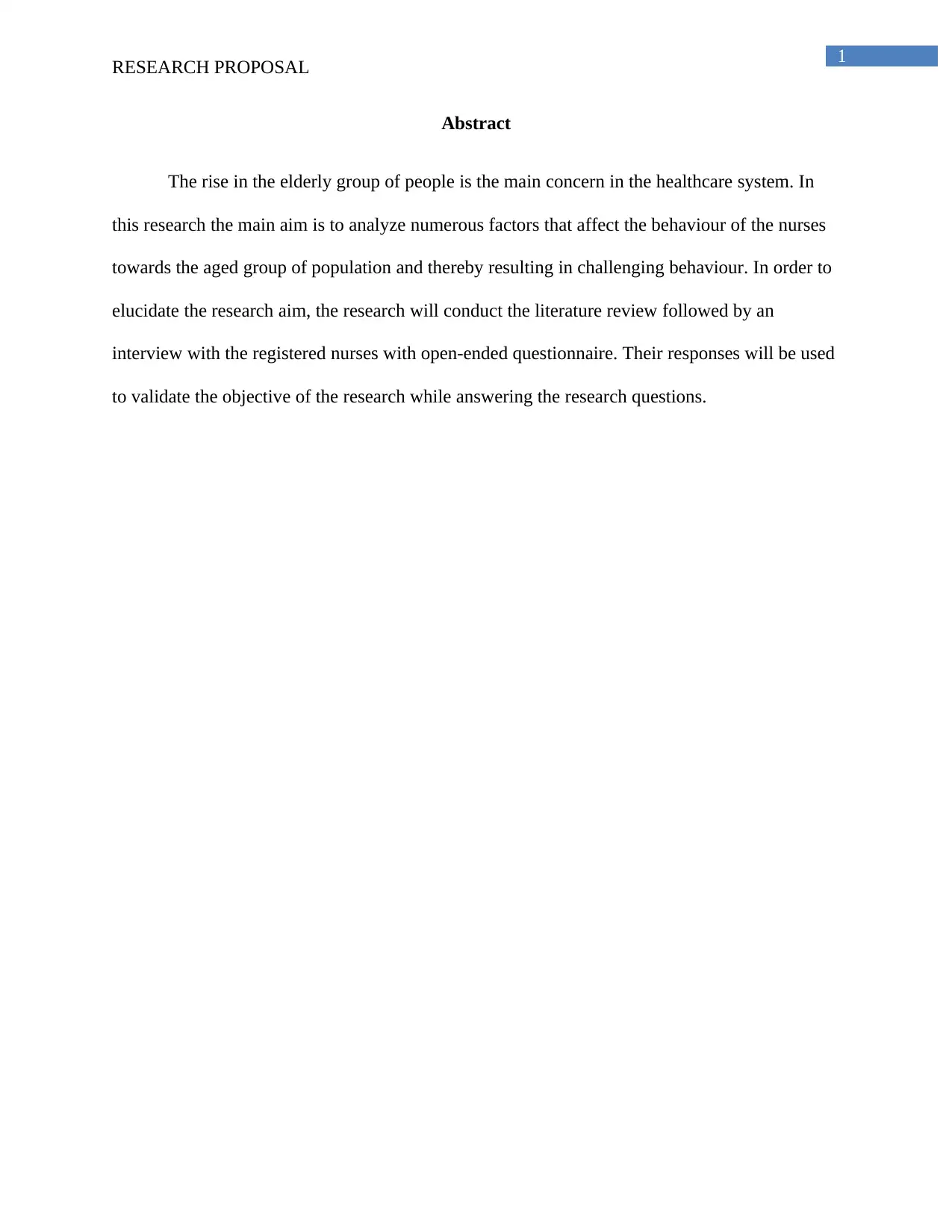
1
RESEARCH PROPOSAL
Abstract
The rise in the elderly group of people is the main concern in the healthcare system. In
this research the main aim is to analyze numerous factors that affect the behaviour of the nurses
towards the aged group of population and thereby resulting in challenging behaviour. In order to
elucidate the research aim, the research will conduct the literature review followed by an
interview with the registered nurses with open-ended questionnaire. Their responses will be used
to validate the objective of the research while answering the research questions.
RESEARCH PROPOSAL
Abstract
The rise in the elderly group of people is the main concern in the healthcare system. In
this research the main aim is to analyze numerous factors that affect the behaviour of the nurses
towards the aged group of population and thereby resulting in challenging behaviour. In order to
elucidate the research aim, the research will conduct the literature review followed by an
interview with the registered nurses with open-ended questionnaire. Their responses will be used
to validate the objective of the research while answering the research questions.
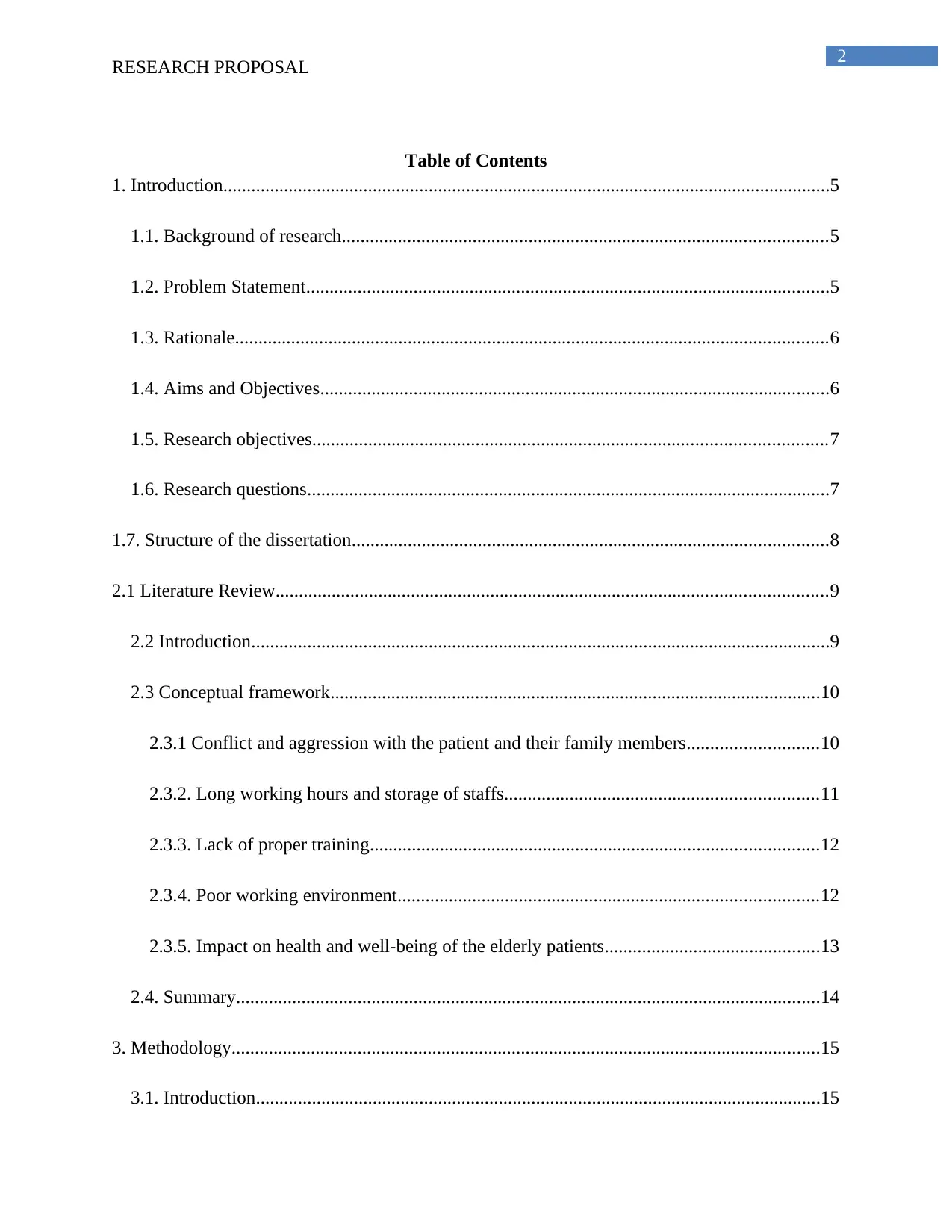
2
RESEARCH PROPOSAL
Table of Contents
1. Introduction..................................................................................................................................5
1.1. Background of research........................................................................................................5
1.2. Problem Statement................................................................................................................5
1.3. Rationale...............................................................................................................................6
1.4. Aims and Objectives.............................................................................................................6
1.5. Research objectives..............................................................................................................7
1.6. Research questions................................................................................................................7
1.7. Structure of the dissertation......................................................................................................8
2.1 Literature Review......................................................................................................................9
2.2 Introduction............................................................................................................................9
2.3 Conceptual framework.........................................................................................................10
2.3.1 Conflict and aggression with the patient and their family members............................10
2.3.2. Long working hours and storage of staffs...................................................................11
2.3.3. Lack of proper training................................................................................................12
2.3.4. Poor working environment..........................................................................................12
2.3.5. Impact on health and well-being of the elderly patients..............................................13
2.4. Summary.............................................................................................................................14
3. Methodology..............................................................................................................................15
3.1. Introduction.........................................................................................................................15
RESEARCH PROPOSAL
Table of Contents
1. Introduction..................................................................................................................................5
1.1. Background of research........................................................................................................5
1.2. Problem Statement................................................................................................................5
1.3. Rationale...............................................................................................................................6
1.4. Aims and Objectives.............................................................................................................6
1.5. Research objectives..............................................................................................................7
1.6. Research questions................................................................................................................7
1.7. Structure of the dissertation......................................................................................................8
2.1 Literature Review......................................................................................................................9
2.2 Introduction............................................................................................................................9
2.3 Conceptual framework.........................................................................................................10
2.3.1 Conflict and aggression with the patient and their family members............................10
2.3.2. Long working hours and storage of staffs...................................................................11
2.3.3. Lack of proper training................................................................................................12
2.3.4. Poor working environment..........................................................................................12
2.3.5. Impact on health and well-being of the elderly patients..............................................13
2.4. Summary.............................................................................................................................14
3. Methodology..............................................................................................................................15
3.1. Introduction.........................................................................................................................15
⊘ This is a preview!⊘
Do you want full access?
Subscribe today to unlock all pages.

Trusted by 1+ million students worldwide
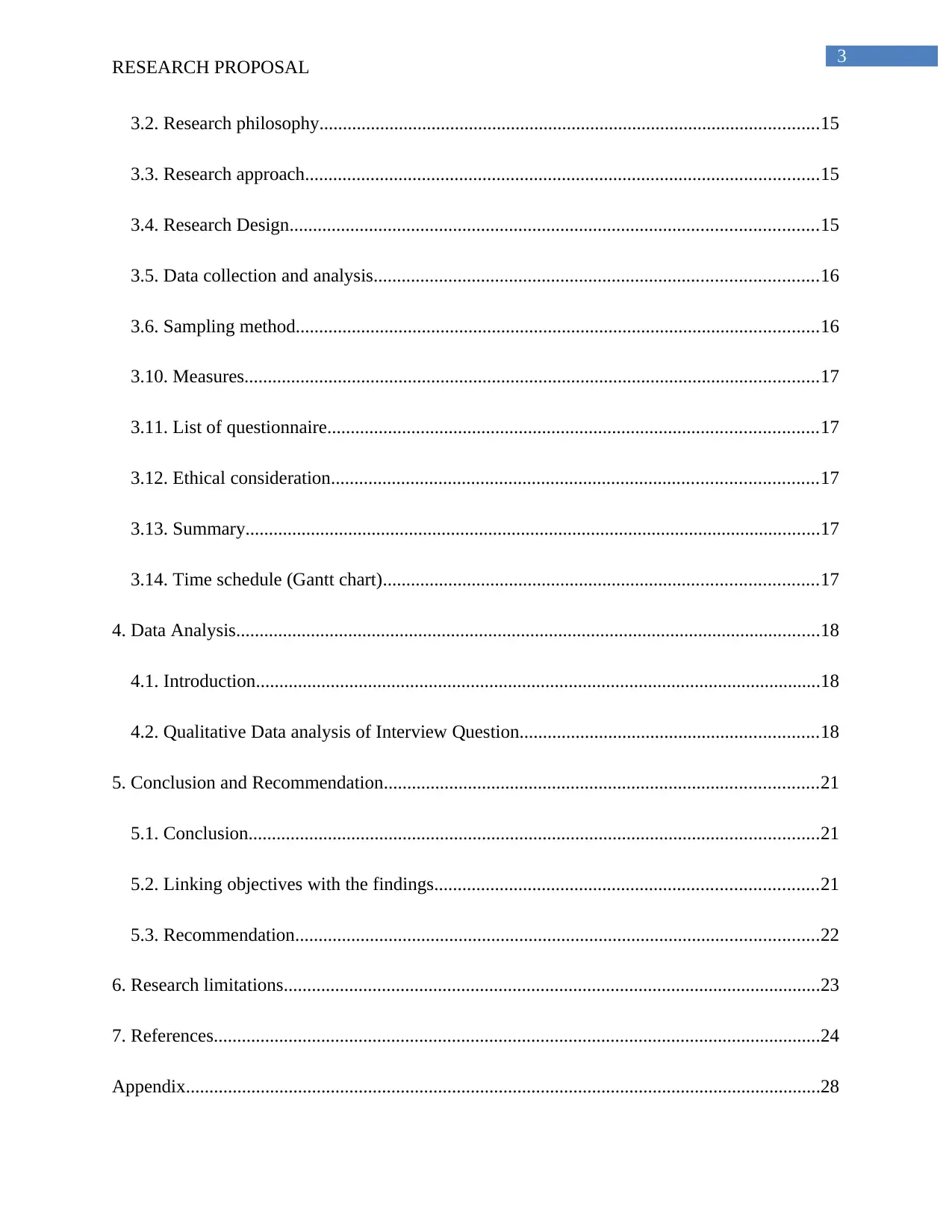
3
RESEARCH PROPOSAL
3.2. Research philosophy...........................................................................................................15
3.3. Research approach..............................................................................................................15
3.4. Research Design.................................................................................................................15
3.5. Data collection and analysis...............................................................................................16
3.6. Sampling method................................................................................................................16
3.10. Measures...........................................................................................................................17
3.11. List of questionnaire.........................................................................................................17
3.12. Ethical consideration........................................................................................................17
3.13. Summary...........................................................................................................................17
3.14. Time schedule (Gantt chart).............................................................................................17
4. Data Analysis.............................................................................................................................18
4.1. Introduction.........................................................................................................................18
4.2. Qualitative Data analysis of Interview Question................................................................18
5. Conclusion and Recommendation.............................................................................................21
5.1. Conclusion..........................................................................................................................21
5.2. Linking objectives with the findings..................................................................................21
5.3. Recommendation................................................................................................................22
6. Research limitations...................................................................................................................23
7. References..................................................................................................................................24
Appendix........................................................................................................................................28
RESEARCH PROPOSAL
3.2. Research philosophy...........................................................................................................15
3.3. Research approach..............................................................................................................15
3.4. Research Design.................................................................................................................15
3.5. Data collection and analysis...............................................................................................16
3.6. Sampling method................................................................................................................16
3.10. Measures...........................................................................................................................17
3.11. List of questionnaire.........................................................................................................17
3.12. Ethical consideration........................................................................................................17
3.13. Summary...........................................................................................................................17
3.14. Time schedule (Gantt chart).............................................................................................17
4. Data Analysis.............................................................................................................................18
4.1. Introduction.........................................................................................................................18
4.2. Qualitative Data analysis of Interview Question................................................................18
5. Conclusion and Recommendation.............................................................................................21
5.1. Conclusion..........................................................................................................................21
5.2. Linking objectives with the findings..................................................................................21
5.3. Recommendation................................................................................................................22
6. Research limitations...................................................................................................................23
7. References..................................................................................................................................24
Appendix........................................................................................................................................28
Paraphrase This Document
Need a fresh take? Get an instant paraphrase of this document with our AI Paraphraser
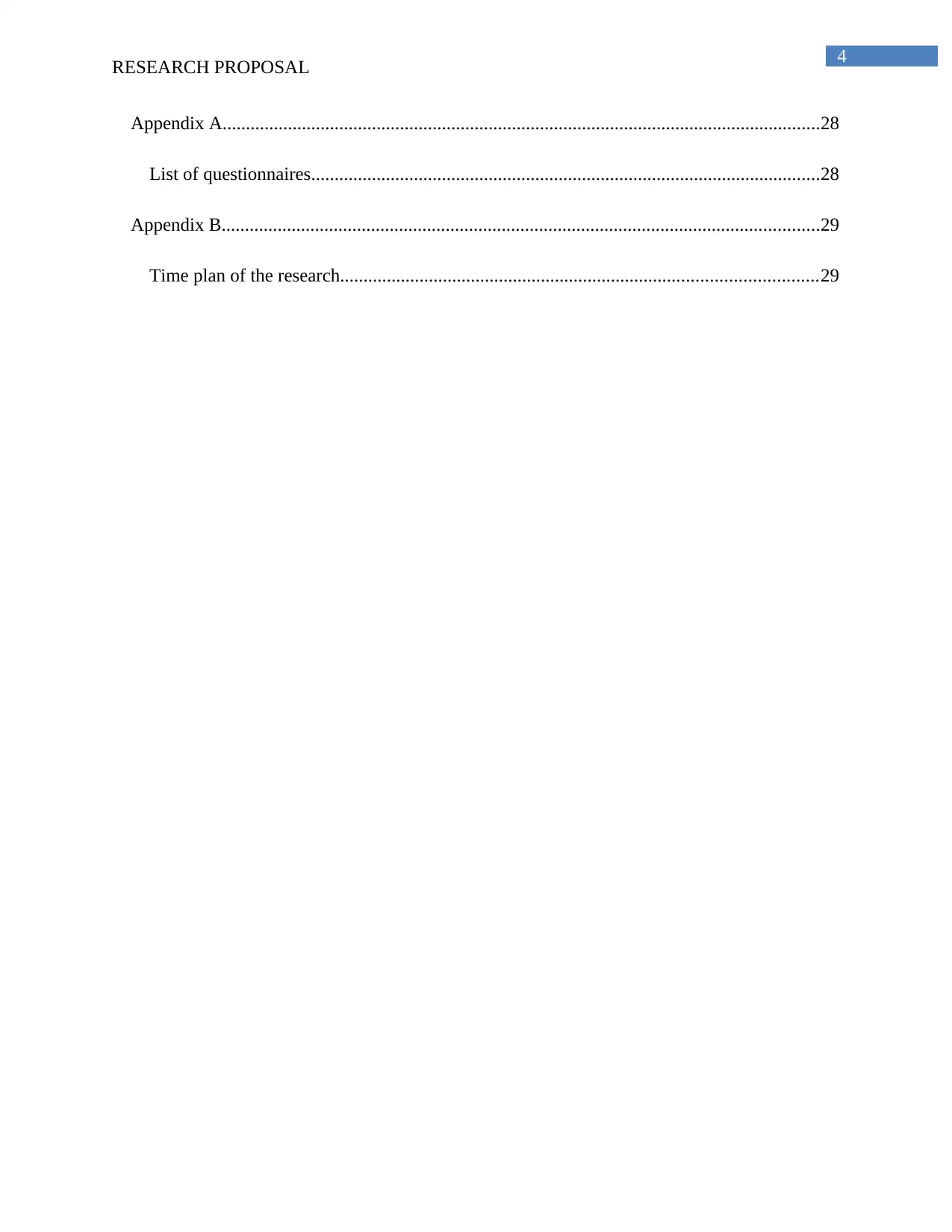
4
RESEARCH PROPOSAL
Appendix A................................................................................................................................28
List of questionnaires.............................................................................................................28
Appendix B................................................................................................................................29
Time plan of the research......................................................................................................29
RESEARCH PROPOSAL
Appendix A................................................................................................................................28
List of questionnaires.............................................................................................................28
Appendix B................................................................................................................................29
Time plan of the research......................................................................................................29
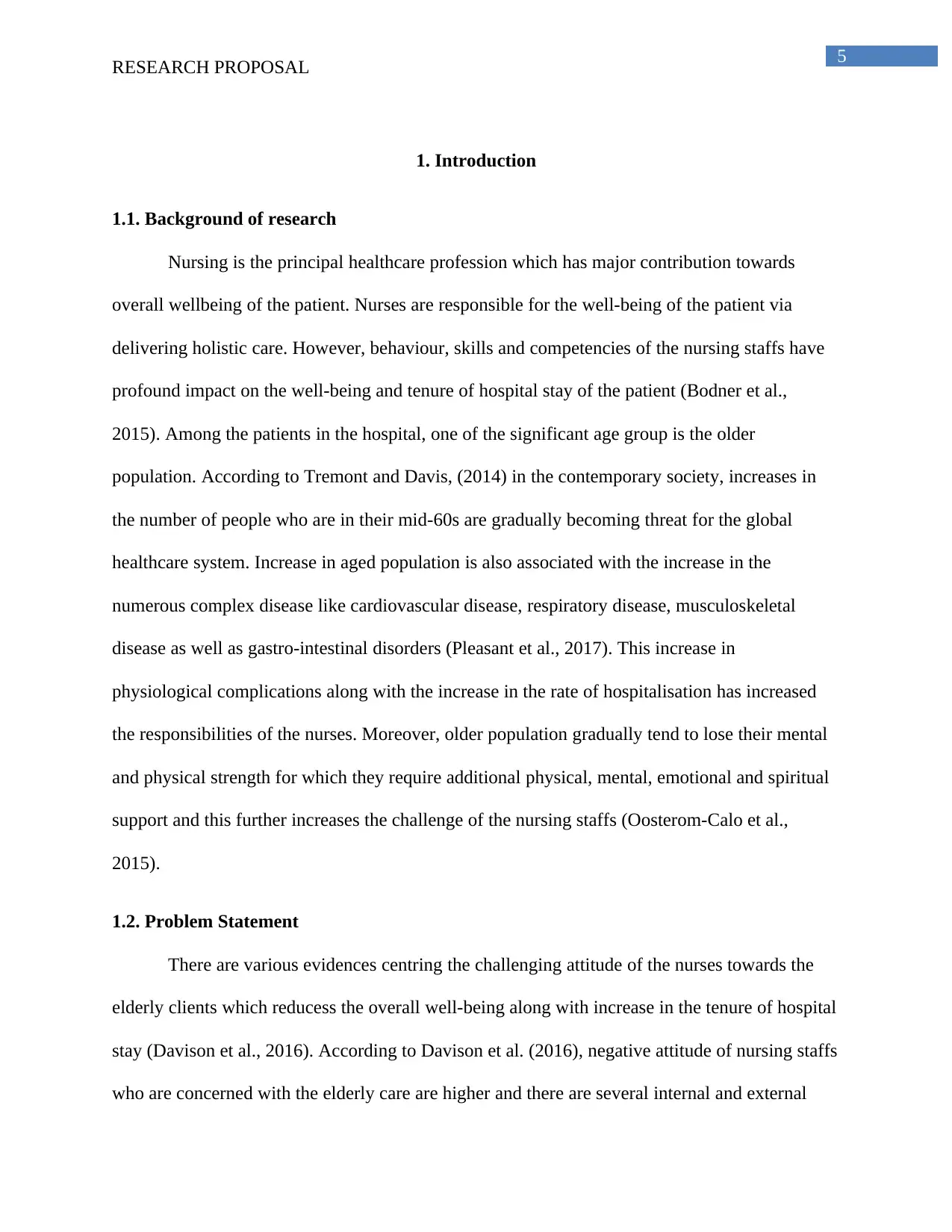
5
RESEARCH PROPOSAL
1. Introduction
1.1. Background of research
Nursing is the principal healthcare profession which has major contribution towards
overall wellbeing of the patient. Nurses are responsible for the well-being of the patient via
delivering holistic care. However, behaviour, skills and competencies of the nursing staffs have
profound impact on the well-being and tenure of hospital stay of the patient (Bodner et al.,
2015). Among the patients in the hospital, one of the significant age group is the older
population. According to Tremont and Davis, (2014) in the contemporary society, increases in
the number of people who are in their mid-60s are gradually becoming threat for the global
healthcare system. Increase in aged population is also associated with the increase in the
numerous complex disease like cardiovascular disease, respiratory disease, musculoskeletal
disease as well as gastro-intestinal disorders (Pleasant et al., 2017). This increase in
physiological complications along with the increase in the rate of hospitalisation has increased
the responsibilities of the nurses. Moreover, older population gradually tend to lose their mental
and physical strength for which they require additional physical, mental, emotional and spiritual
support and this further increases the challenge of the nursing staffs (Oosterom-Calo et al.,
2015).
1.2. Problem Statement
There are various evidences centring the challenging attitude of the nurses towards the
elderly clients which reducess the overall well-being along with increase in the tenure of hospital
stay (Davison et al., 2016). According to Davison et al. (2016), negative attitude of nursing staffs
who are concerned with the elderly care are higher and there are several internal and external
RESEARCH PROPOSAL
1. Introduction
1.1. Background of research
Nursing is the principal healthcare profession which has major contribution towards
overall wellbeing of the patient. Nurses are responsible for the well-being of the patient via
delivering holistic care. However, behaviour, skills and competencies of the nursing staffs have
profound impact on the well-being and tenure of hospital stay of the patient (Bodner et al.,
2015). Among the patients in the hospital, one of the significant age group is the older
population. According to Tremont and Davis, (2014) in the contemporary society, increases in
the number of people who are in their mid-60s are gradually becoming threat for the global
healthcare system. Increase in aged population is also associated with the increase in the
numerous complex disease like cardiovascular disease, respiratory disease, musculoskeletal
disease as well as gastro-intestinal disorders (Pleasant et al., 2017). This increase in
physiological complications along with the increase in the rate of hospitalisation has increased
the responsibilities of the nurses. Moreover, older population gradually tend to lose their mental
and physical strength for which they require additional physical, mental, emotional and spiritual
support and this further increases the challenge of the nursing staffs (Oosterom-Calo et al.,
2015).
1.2. Problem Statement
There are various evidences centring the challenging attitude of the nurses towards the
elderly clients which reducess the overall well-being along with increase in the tenure of hospital
stay (Davison et al., 2016). According to Davison et al. (2016), negative attitude of nursing staffs
who are concerned with the elderly care are higher and there are several internal and external
⊘ This is a preview!⊘
Do you want full access?
Subscribe today to unlock all pages.

Trusted by 1+ million students worldwide
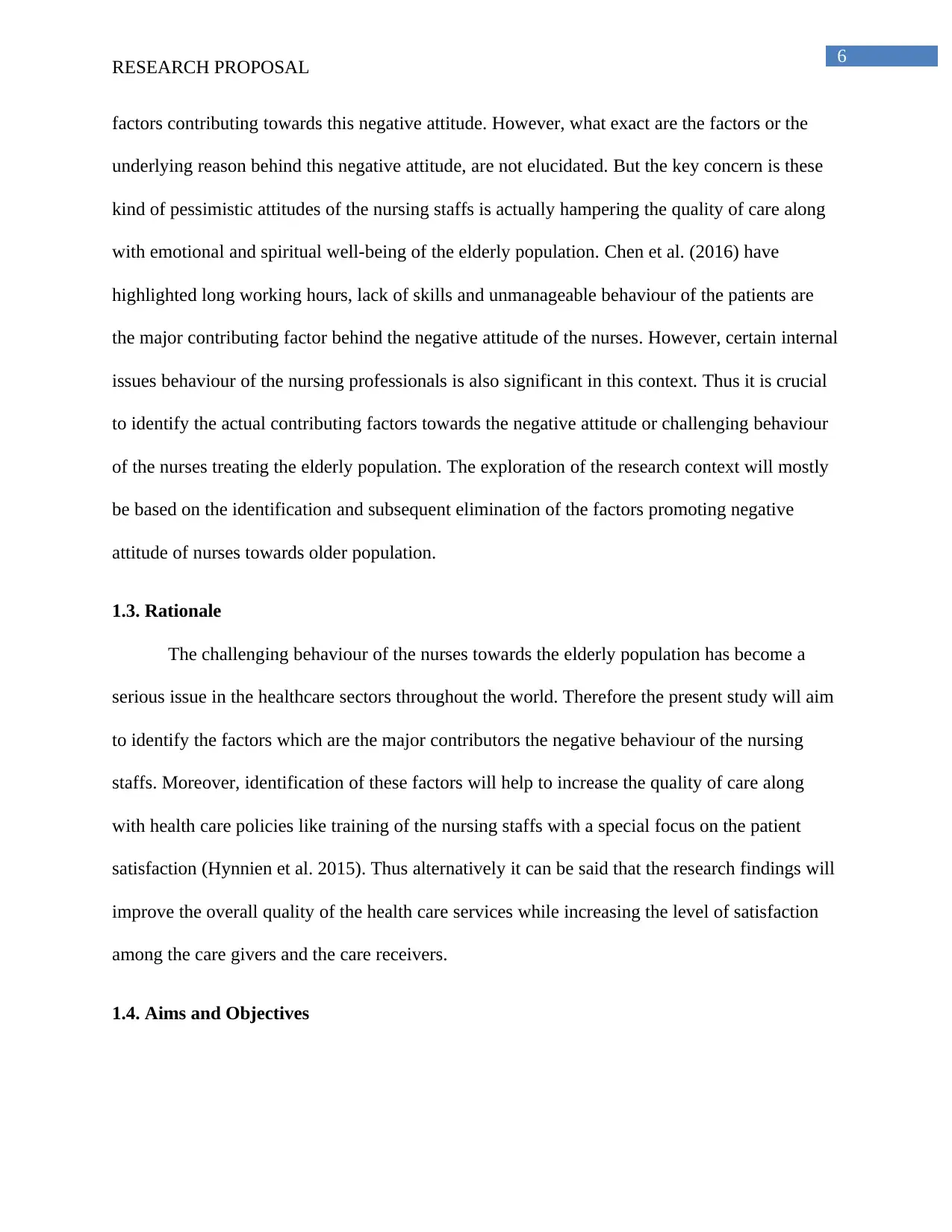
6
RESEARCH PROPOSAL
factors contributing towards this negative attitude. However, what exact are the factors or the
underlying reason behind this negative attitude, are not elucidated. But the key concern is these
kind of pessimistic attitudes of the nursing staffs is actually hampering the quality of care along
with emotional and spiritual well-being of the elderly population. Chen et al. (2016) have
highlighted long working hours, lack of skills and unmanageable behaviour of the patients are
the major contributing factor behind the negative attitude of the nurses. However, certain internal
issues behaviour of the nursing professionals is also significant in this context. Thus it is crucial
to identify the actual contributing factors towards the negative attitude or challenging behaviour
of the nurses treating the elderly population. The exploration of the research context will mostly
be based on the identification and subsequent elimination of the factors promoting negative
attitude of nurses towards older population.
1.3. Rationale
The challenging behaviour of the nurses towards the elderly population has become a
serious issue in the healthcare sectors throughout the world. Therefore the present study will aim
to identify the factors which are the major contributors the negative behaviour of the nursing
staffs. Moreover, identification of these factors will help to increase the quality of care along
with health care policies like training of the nursing staffs with a special focus on the patient
satisfaction (Hynnien et al. 2015). Thus alternatively it can be said that the research findings will
improve the overall quality of the health care services while increasing the level of satisfaction
among the care givers and the care receivers.
1.4. Aims and Objectives
RESEARCH PROPOSAL
factors contributing towards this negative attitude. However, what exact are the factors or the
underlying reason behind this negative attitude, are not elucidated. But the key concern is these
kind of pessimistic attitudes of the nursing staffs is actually hampering the quality of care along
with emotional and spiritual well-being of the elderly population. Chen et al. (2016) have
highlighted long working hours, lack of skills and unmanageable behaviour of the patients are
the major contributing factor behind the negative attitude of the nurses. However, certain internal
issues behaviour of the nursing professionals is also significant in this context. Thus it is crucial
to identify the actual contributing factors towards the negative attitude or challenging behaviour
of the nurses treating the elderly population. The exploration of the research context will mostly
be based on the identification and subsequent elimination of the factors promoting negative
attitude of nurses towards older population.
1.3. Rationale
The challenging behaviour of the nurses towards the elderly population has become a
serious issue in the healthcare sectors throughout the world. Therefore the present study will aim
to identify the factors which are the major contributors the negative behaviour of the nursing
staffs. Moreover, identification of these factors will help to increase the quality of care along
with health care policies like training of the nursing staffs with a special focus on the patient
satisfaction (Hynnien et al. 2015). Thus alternatively it can be said that the research findings will
improve the overall quality of the health care services while increasing the level of satisfaction
among the care givers and the care receivers.
1.4. Aims and Objectives
Paraphrase This Document
Need a fresh take? Get an instant paraphrase of this document with our AI Paraphraser
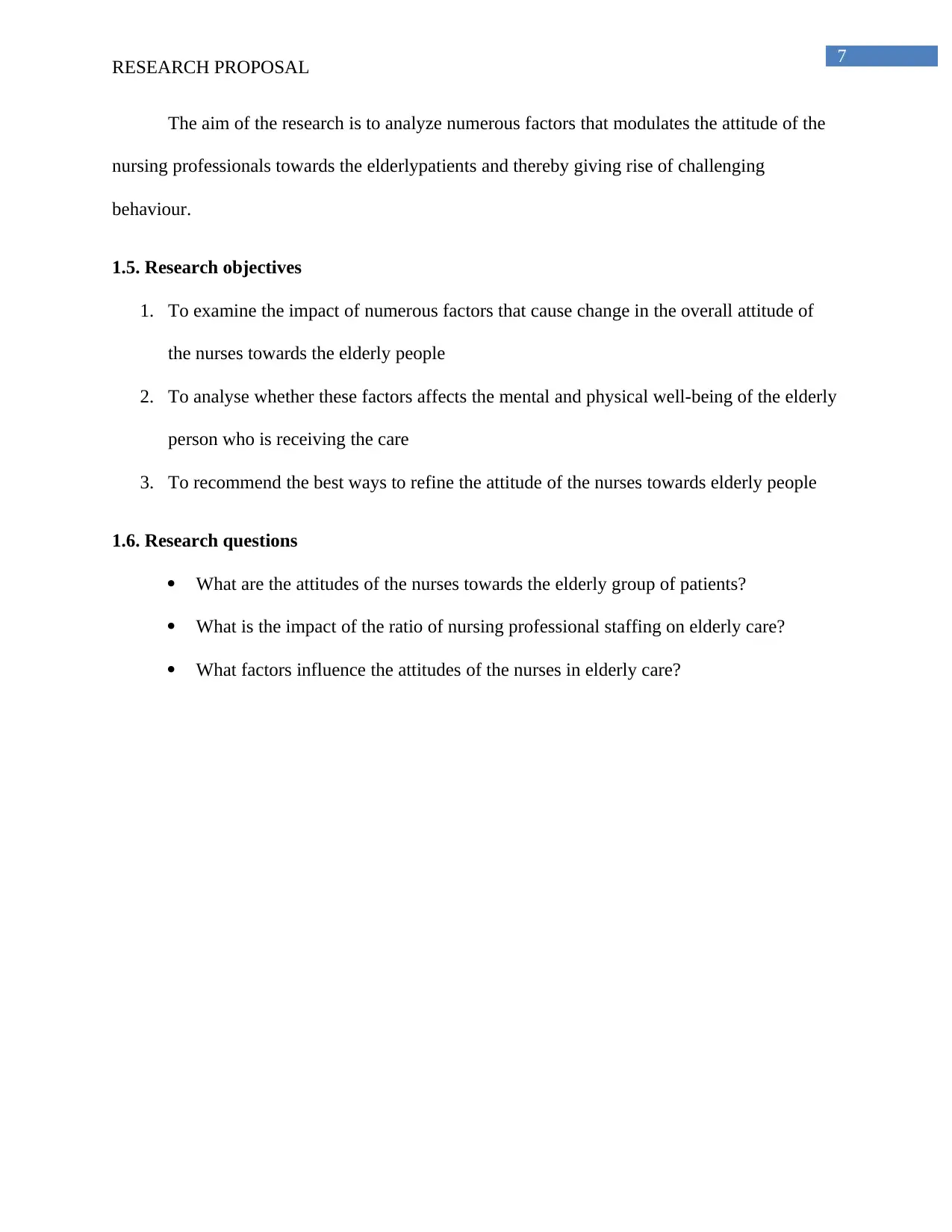
7
RESEARCH PROPOSAL
The aim of the research is to analyze numerous factors that modulates the attitude of the
nursing professionals towards the elderlypatients and thereby giving rise of challenging
behaviour.
1.5. Research objectives
1. To examine the impact of numerous factors that cause change in the overall attitude of
the nurses towards the elderly people
2. To analyse whether these factors affects the mental and physical well-being of the elderly
person who is receiving the care
3. To recommend the best ways to refine the attitude of the nurses towards elderly people
1.6. Research questions
What are the attitudes of the nurses towards the elderly group of patients?
What is the impact of the ratio of nursing professional staffing on elderly care?
What factors influence the attitudes of the nurses in elderly care?
RESEARCH PROPOSAL
The aim of the research is to analyze numerous factors that modulates the attitude of the
nursing professionals towards the elderlypatients and thereby giving rise of challenging
behaviour.
1.5. Research objectives
1. To examine the impact of numerous factors that cause change in the overall attitude of
the nurses towards the elderly people
2. To analyse whether these factors affects the mental and physical well-being of the elderly
person who is receiving the care
3. To recommend the best ways to refine the attitude of the nurses towards elderly people
1.6. Research questions
What are the attitudes of the nurses towards the elderly group of patients?
What is the impact of the ratio of nursing professional staffing on elderly care?
What factors influence the attitudes of the nurses in elderly care?
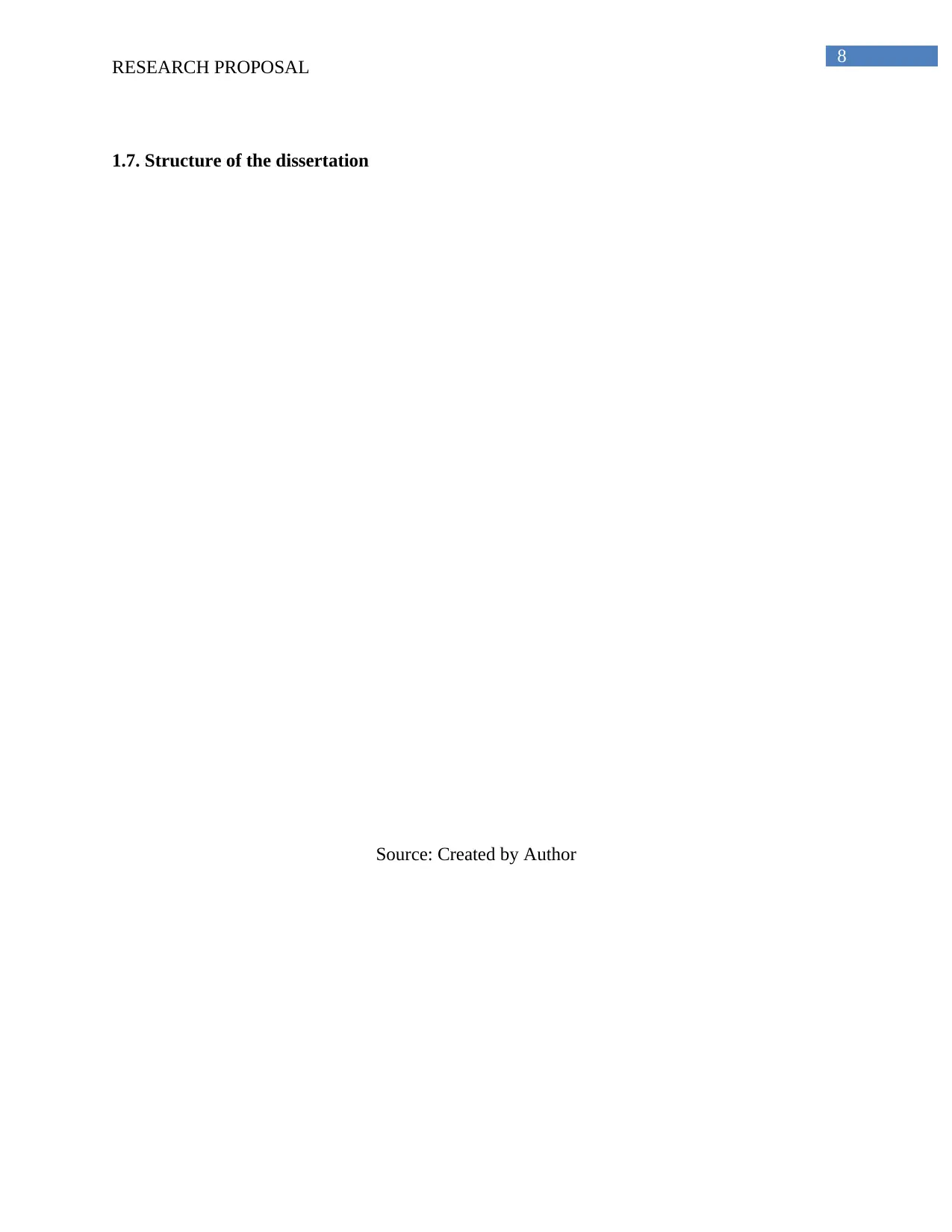
8
RESEARCH PROPOSAL
1.7. Structure of the dissertation
Source: Created by Author
RESEARCH PROPOSAL
1.7. Structure of the dissertation
Source: Created by Author
⊘ This is a preview!⊘
Do you want full access?
Subscribe today to unlock all pages.

Trusted by 1+ million students worldwide
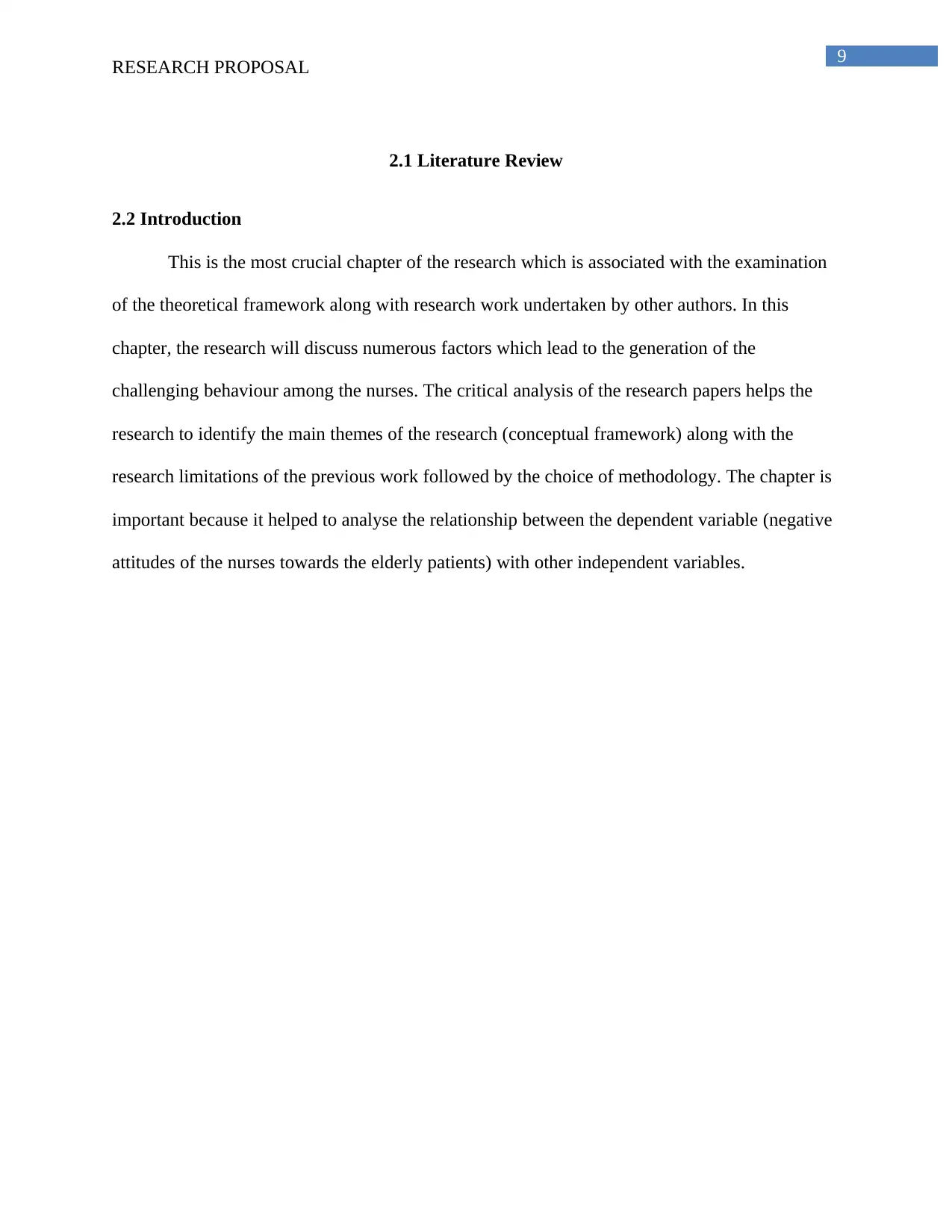
9
RESEARCH PROPOSAL
2.1 Literature Review
2.2 Introduction
This is the most crucial chapter of the research which is associated with the examination
of the theoretical framework along with research work undertaken by other authors. In this
chapter, the research will discuss numerous factors which lead to the generation of the
challenging behaviour among the nurses. The critical analysis of the research papers helps the
research to identify the main themes of the research (conceptual framework) along with the
research limitations of the previous work followed by the choice of methodology. The chapter is
important because it helped to analyse the relationship between the dependent variable (negative
attitudes of the nurses towards the elderly patients) with other independent variables.
RESEARCH PROPOSAL
2.1 Literature Review
2.2 Introduction
This is the most crucial chapter of the research which is associated with the examination
of the theoretical framework along with research work undertaken by other authors. In this
chapter, the research will discuss numerous factors which lead to the generation of the
challenging behaviour among the nurses. The critical analysis of the research papers helps the
research to identify the main themes of the research (conceptual framework) along with the
research limitations of the previous work followed by the choice of methodology. The chapter is
important because it helped to analyse the relationship between the dependent variable (negative
attitudes of the nurses towards the elderly patients) with other independent variables.
Paraphrase This Document
Need a fresh take? Get an instant paraphrase of this document with our AI Paraphraser
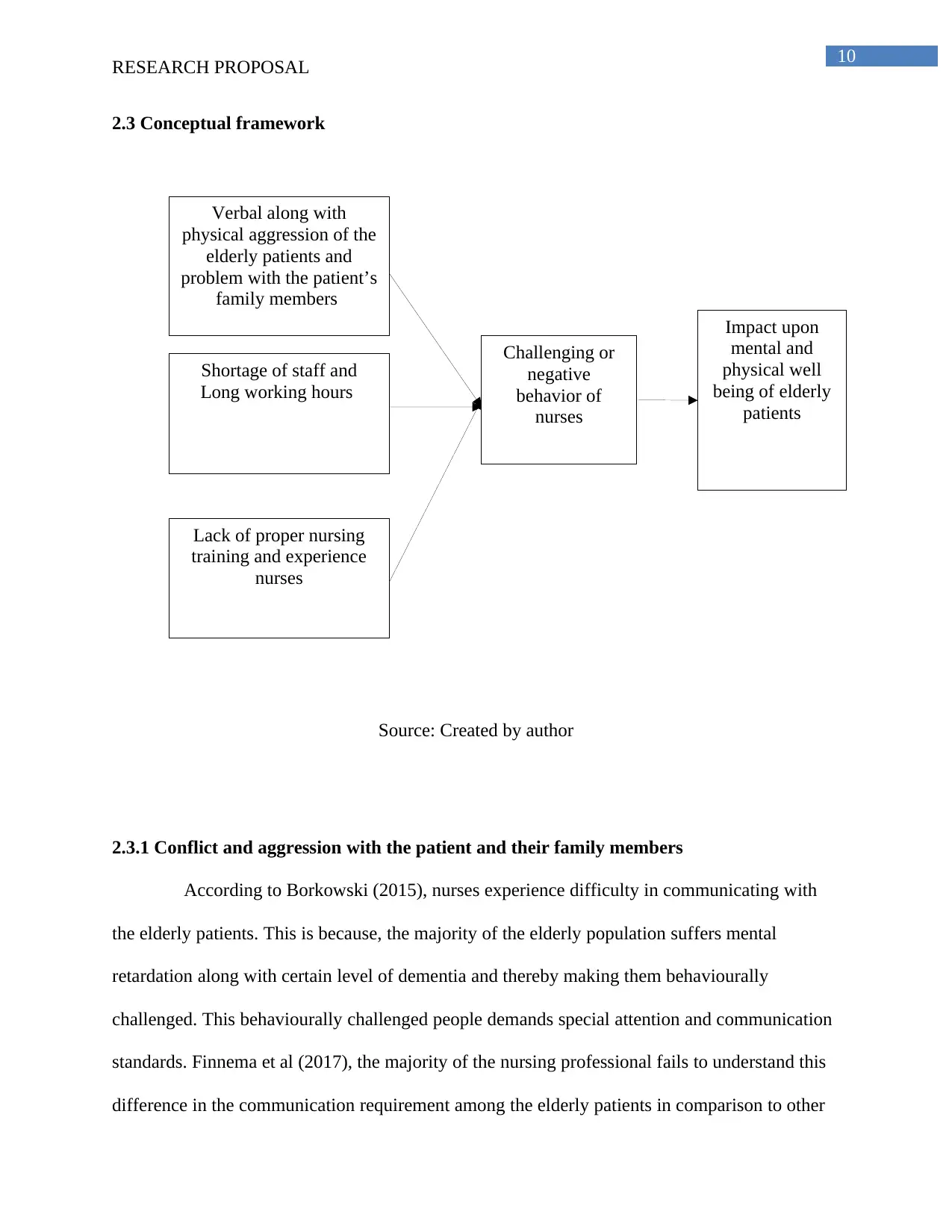
10
Verbal along with
physical aggression of the
elderly patients and
problem with the patient’s
family members
Lack of proper nursing
training and experience
nurses
Shortage of staff and
Long working hours
Challenging or
negative
behavior of
nurses
Impact upon
mental and
physical well
being of elderly
patients
RESEARCH PROPOSAL
2.3 Conceptual framework
Source: Created by author
2.3.1 Conflict and aggression with the patient and their family members
According to Borkowski (2015), nurses experience difficulty in communicating with
the elderly patients. This is because, the majority of the elderly population suffers mental
retardation along with certain level of dementia and thereby making them behaviourally
challenged. This behaviourally challenged people demands special attention and communication
standards. Finnema et al (2017), the majority of the nursing professional fails to understand this
difference in the communication requirement among the elderly patients in comparison to other
Verbal along with
physical aggression of the
elderly patients and
problem with the patient’s
family members
Lack of proper nursing
training and experience
nurses
Shortage of staff and
Long working hours
Challenging or
negative
behavior of
nurses
Impact upon
mental and
physical well
being of elderly
patients
RESEARCH PROPOSAL
2.3 Conceptual framework
Source: Created by author
2.3.1 Conflict and aggression with the patient and their family members
According to Borkowski (2015), nurses experience difficulty in communicating with
the elderly patients. This is because, the majority of the elderly population suffers mental
retardation along with certain level of dementia and thereby making them behaviourally
challenged. This behaviourally challenged people demands special attention and communication
standards. Finnema et al (2017), the majority of the nursing professional fails to understand this
difference in the communication requirement among the elderly patients in comparison to other
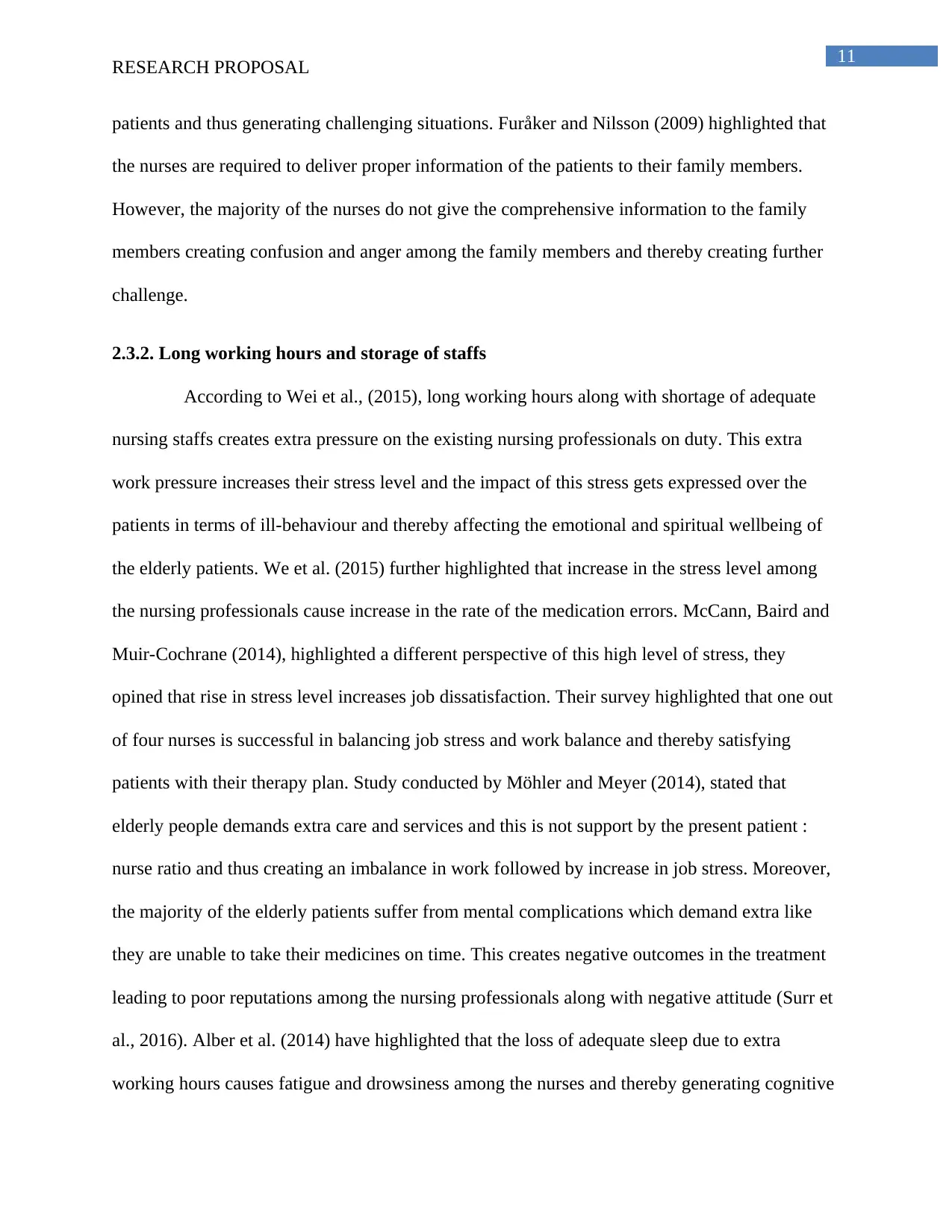
11
RESEARCH PROPOSAL
patients and thus generating challenging situations. Furåker and Nilsson (2009) highlighted that
the nurses are required to deliver proper information of the patients to their family members.
However, the majority of the nurses do not give the comprehensive information to the family
members creating confusion and anger among the family members and thereby creating further
challenge.
2.3.2. Long working hours and storage of staffs
According to Wei et al., (2015), long working hours along with shortage of adequate
nursing staffs creates extra pressure on the existing nursing professionals on duty. This extra
work pressure increases their stress level and the impact of this stress gets expressed over the
patients in terms of ill-behaviour and thereby affecting the emotional and spiritual wellbeing of
the elderly patients. We et al. (2015) further highlighted that increase in the stress level among
the nursing professionals cause increase in the rate of the medication errors. McCann, Baird and
Muir-Cochrane (2014), highlighted a different perspective of this high level of stress, they
opined that rise in stress level increases job dissatisfaction. Their survey highlighted that one out
of four nurses is successful in balancing job stress and work balance and thereby satisfying
patients with their therapy plan. Study conducted by Möhler and Meyer (2014), stated that
elderly people demands extra care and services and this is not support by the present patient :
nurse ratio and thus creating an imbalance in work followed by increase in job stress. Moreover,
the majority of the elderly patients suffer from mental complications which demand extra like
they are unable to take their medicines on time. This creates negative outcomes in the treatment
leading to poor reputations among the nursing professionals along with negative attitude (Surr et
al., 2016). Alber et al. (2014) have highlighted that the loss of adequate sleep due to extra
working hours causes fatigue and drowsiness among the nurses and thereby generating cognitive
RESEARCH PROPOSAL
patients and thus generating challenging situations. Furåker and Nilsson (2009) highlighted that
the nurses are required to deliver proper information of the patients to their family members.
However, the majority of the nurses do not give the comprehensive information to the family
members creating confusion and anger among the family members and thereby creating further
challenge.
2.3.2. Long working hours and storage of staffs
According to Wei et al., (2015), long working hours along with shortage of adequate
nursing staffs creates extra pressure on the existing nursing professionals on duty. This extra
work pressure increases their stress level and the impact of this stress gets expressed over the
patients in terms of ill-behaviour and thereby affecting the emotional and spiritual wellbeing of
the elderly patients. We et al. (2015) further highlighted that increase in the stress level among
the nursing professionals cause increase in the rate of the medication errors. McCann, Baird and
Muir-Cochrane (2014), highlighted a different perspective of this high level of stress, they
opined that rise in stress level increases job dissatisfaction. Their survey highlighted that one out
of four nurses is successful in balancing job stress and work balance and thereby satisfying
patients with their therapy plan. Study conducted by Möhler and Meyer (2014), stated that
elderly people demands extra care and services and this is not support by the present patient :
nurse ratio and thus creating an imbalance in work followed by increase in job stress. Moreover,
the majority of the elderly patients suffer from mental complications which demand extra like
they are unable to take their medicines on time. This creates negative outcomes in the treatment
leading to poor reputations among the nursing professionals along with negative attitude (Surr et
al., 2016). Alber et al. (2014) have highlighted that the loss of adequate sleep due to extra
working hours causes fatigue and drowsiness among the nurses and thereby generating cognitive
⊘ This is a preview!⊘
Do you want full access?
Subscribe today to unlock all pages.

Trusted by 1+ million students worldwide
1 out of 31
Related Documents
Your All-in-One AI-Powered Toolkit for Academic Success.
+13062052269
info@desklib.com
Available 24*7 on WhatsApp / Email
![[object Object]](/_next/static/media/star-bottom.7253800d.svg)
Unlock your academic potential
Copyright © 2020–2026 A2Z Services. All Rights Reserved. Developed and managed by ZUCOL.





